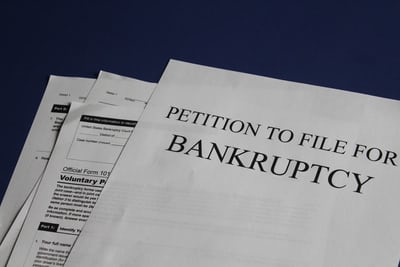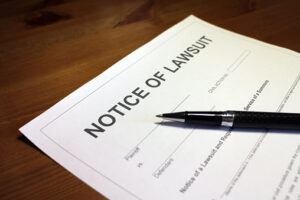What Happens When You File Bankruptcy?
When someone is suffering from financial difficulty, they generally view bankruptcy as a last resort. A popular (and wrong) assumption is that bankruptcy is just for people who take on too much credit card debt, and while this can be true, people also file bankruptcy after suffering a major, unexpected financial blow—like loss of a job, or a divorce, or a lawsuit or an unexpected illness. While it is true that filing bankruptcy can give you the opportunity to get on top of your financial situation, or in many cases, wipe the slate clean, it is important to understand the pros and cons of filing bankruptcy. Read on to find out more about what happens when you file bankruptcy.
First, Who May File for Bankruptcy?
In general any person, business, or entity can file for bankruptcy. There is no minimum amount of debt required; however, in most cases, a person who files does owe considerably more in debts than he or she can pay. Depending on the amount owed, there may be restrictions as to what kinds of bankruptcies may be filed.
What Happens When I File Bankruptcy?
Bankruptcy provides the opportunity to pay down a portion of your debts over time in Chapter 13 (3-5 years) or in Chapter 7 to have some or most of them completely eliminated. In most cases, debts like credit cards and medical debts also get eliminated in Chapter 13.
When you file bankruptcy, something known as the “automatic stay” immediately comes into play. The automatic stay is like having a large, scary-looking person standing between you and your creditors. It is an order that keeps creditors from trying to collect. They cannot deduct money from your bank account, garnish your wages or go after any of your other assets (or if they were doing so before you filed bankruptcy, they have to immediately stop), without first getting permission from the bankruptcy court. And that is not necessarily an easy process for them. The stay stops most creditor calls, wage garnishments, and lawsuits, but not everything will stop: creditors can still collect support payments and criminal cases will continue to proceed forward. The automatic stay will stop evictions and foreclosures, at least temporarily.
What Happens to My Personal Property?
What happens to your personal property (clothing, furniture, cars, bank accounts, retirement, etc.) depends on which bankruptcy chapter you file, Chapter 7 or Chapter 13.
Here’s what to expect:
Certain property is exempt from bankruptcy proceedings and can be kept by the debtor. In Montana, there is an exemption of $250,000 worth of equity in a homestead. Pension and retirement benefits may also be exempt. In addition, exempt property can include household furnishings and personal effects like tools of the trade, and life insurance. These exemptions, if available, are subject to value limitations. For example, in Montana, you can protect only up to $2,500.00 of equity in one motor vehicle if your name is on the title. Other exemptions may also be available in particular circumstances. The exemptions apply only to equity in real or personal property, which means that if property has been placed as security for a loan (such as a mortgage on a residence or a lien on the title of a car), the availability of the exemption may be limited.
Chapter 7
Chapter 7 bankruptcy is often called liquidation or fresh start bankruptcy. This is the most common type of bankruptcy proceeding, and is most often the simplest. In this form, the debtor can retain exempt property (discussed above). All non-exempt property is turned over for sale to pay creditors. Most debts are discharged in a Chapter 7 bankruptcy, meaning that the debtor is no longer legally obligated to pay the discharged debts.
Chapter 13
A Chapter 13 bankruptcy, is for individuals with “regular income.” It is sometimes called a “wage-earner plan,” although it is available to people with other kinds of regular income, whether that be from self-employment, welfare, or some additional sources. Under Chapter 13, a debtor has more flexibility in deciding which assets to keep and may be able to extend the time for repayment of debts. In Chapter 13, some of your debts will be reorganized so that you can pay them off partially or in full over the next three to five years.
Keep in mind, though, that if you don’t comply with the payment plan, your creditors may be able to go after your assets to satisfy your debts.
Will I Be Able to Own Anything After Bankruptcy?
As a general rule, there is no limitation on the future ability of a debtor to own or acquire real or personal property. In most cases, creditors whose claims are discharged in bankruptcy will not be able to take property or earnings acquired after the filing of bankruptcy. However, some special types of interests (such as inheritances, property settlements, and life insurance proceeds) if acquired within a certain time after bankruptcy, may become available for payment to creditors.
Does My Spouse Have to File With Me?
Nope. There is no requirement that a husband and wife file bankruptcy together. In some instances, if most debts are owed by one spouse, it may be appropriate for that spouse to file alone. Jointly owned property, however, may be affected if only one spouse files for bankruptcy. In most cases, a husband and wife have the same debts or co-signed the same loan agreements. If only one spouse files in this situation, the creditors can continue to demand payment from the spouse who did not file. Typically it costs the same whether one or both spouses file.
What Happens to My Credit if I Declare Bankruptcy?
Bankruptcy may appear on a person’s credit record for ten years and may hamper access to credit for a time. However, a person contemplating bankruptcy may already have a poor credit rating. In some cases, bankruptcy may actually improve the ability to obtain credit, since many of the debtor’s former debts are discharged. Your local credit bureau may be able to provide information about the policy of lenders and creditors in your area with regard to the effect of bankruptcy on a person’s ability to obtain credit.
How Will Bankruptcy Effect Persons Who Have Co-Signed Loans with Me?
A person who co-signed a loan with you may still be held responsible for the debt if you file for straight bankruptcy. A Chapter 13 Bankruptcy may suspend legal and collection action(s) against your co-signer for a time. Your attorney will explain the effect your particular bankruptcy would have on anyone who co-signed any loans with you. A Bankruptcy can stay on your credit report for 7-10 years. This does not mean that you will not be able to obtain credit during this time, but it might impact the interest rate or the kinds of loans you can get, especially in the first year or two after the bankruptcy is over. Also, the credit scoring models favor new information over old information. So with positive credit habits post-bankruptcy, your credit score can recover over time, even while the bankruptcy is still on your credit report. Are Bankruptcy Filings Publicly Available? Bankruptcies are considered a public record, but that doesn’t mean everyone’s going to know about it. Bankruptcy proceedings are filed in a system called Public Access to Court Electronic Records, or PACER for short. For the most part, it’s more common for attorneys and creditors to use this system to look up information about your bankruptcy. But anyone can register and check if they want to. The service charges 10 cents per page to access case information. Another way people might find out about your bankruptcy is if your local newspaper publishes public notices. Most newspapers in Montana do not publish this information, but if you are concerned about it, you should check into it before filing bankruptcy. Finally, employers, landlords, and creditors may be able to see on your credit report that you’ve filed bankruptcy when you apply for a job, an apartment lease, or a loan or credit card. Will Bankruptcy Affect My Job or Future Employment? Over 25% of employers run a credit check on new job applicants, according to a survey by CareerBuilder. As a result, declaring bankruptcy could affect your ability to get a new job, especially if that job is in the financial services industry or with a government entity. They do this primarily to make sure you’re a good fit for the jobs—such as handling money—and that you’re not financially stressed, which could increase the likelihood of theft or fraud. If an employer simply runs a routine criminal background check, however, your bankruptcy won’t show up. It’s less likely that employers would conduct background checks on current employees. So if you’re not planning to switch jobs, you likely don’t need to worry much about a bankruptcy affecting your employment.How Can I Tell Whether or not I Should File For Bankruptcy?
If you only have a few debts, it is advisable to contact your creditors to try to work out a payment plan with them rather than filing for bankruptcy. You can find assistance in avoiding bankruptcy by contacting a local consumer credit counseling agency, consumer credit bureau, or legal services office. Be sure to check them out carefully as they are not all legitimately interested in helping you, instead seeing you as an opportunity to make some money. If you feel bankruptcy may be necessary, you should consult with an attorney. Here at Geranios Law, I will provide a free consultation to prospective clients that fill out my bankruptcy worksheet. At that consultation, I will analyze your situation and explain all procedures involved with filing for bankruptcy, evaluate your exemptions and non-dischargeable debts, and attend to all other matters involved with the bankruptcy proceeding.







